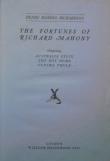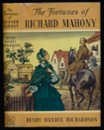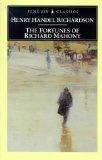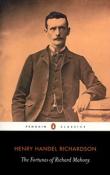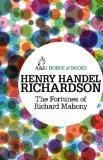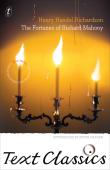AustLit
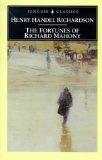 638618891775411741.jpg
638618891775411741.jpg
 The Fortunes of Richard Mahony : Comprising Australia Felix, The Way Home, Ultima Thule
selected work
historical fiction
The Fortunes of Richard Mahony : Comprising Australia Felix, The Way Home, Ultima Thule
selected work
historical fiction
Latest Issues
AbstractHistoryArchive Description
The Fortunes of Richard Mahony was 'first published as a sequence. Australia Felix, the first volume, which covers twelve years of Richard Mahony’s life from the early 1850s, was published in 1917; The Way Home, which deals with his subsequent eight years, appeared in 1925; and Ultima Thule, the final volume covering his last four years, in 1929. The novel was first published as a trilogy in 1930.'
Australia Felix 'begins the story of Richard Mahony, a 28-year-old medical graduate of Edinburgh University and now the keeper of a general store in Ballarat'. Part one of the novel 'follows Mahony’s career until his marriage; the second part deals with the Eureka Stockade, the growth of the varied society of Ballarat and legal hearing in Melbourne'. It 'concludes with Mahony’s decision to start a practice in Ballarat instead of returning to England'. In parts three and four, 'Richardson extends her panoramic picture of a dynamic colonial society in which individuals are subject to great reversals or advances of fortune'.
The Way Home begins with Mahony’s 'arrival in England and concludes with his final, second return to Australia, as a ruined man. In the intervening years he grows disillusioned with English society, returns to Australia to find his investments have made him suddenly rich, attempts to settle into the wealthy community of Melbourne and becomes the father of three children'. His sojourn in England leads to the discovery that he is uncomfortable with the ‘offensive and cramping’ English social hierarchy.
Ultima Thule picks up the story with Mahony’s 'return to Australia, his attempts to establish himself as a medical practitioner, first in Melbourne and then at Barambogie, a small town in northern Victoria'. When Mahony’s skills as a doctor as increasingly questioned, the family moves to the coast and later to Gymgurra where Mahony’s wife, Mary, 'secures a position as postmistress'. Mahony is moved to a private nursing home, then to a government asylum and finally returns home. He is 'devotedly cared by Mary, until paralysis incapacitates his body. After his death he is buried in the local cemetery, within sound of the sea'.
Source: The Oxford Companion to Australian Literature. 2nd. ed. Melbourne: Oxford University Press, 1994: 294-295.
Adaptations
-
form
y
 The Fortunes of Richard Mahony
Australia
:
Australian Broadcasting Commission
,
1949-1950
9494408
1949
series - publisher
radio play
historical fiction
The Fortunes of Richard Mahony
Australia
:
Australian Broadcasting Commission
,
1949-1950
9494408
1949
series - publisher
radio play
historical fiction
A radio adaptation of Henry Handel Richardson's novel.
-
y
 Ultima Thulet : A Libretto
1997
Z1413664
1997
single work
lyric/song
Ultima Thulet : A Libretto
1997
Z1413664
1997
single work
lyric/song
-
y
 The Fortunes of Richard Mahony
Sydney
:
Currency Press
Playbox Theatre
,
2002
Z980470
2002
single work
drama
(taught in 1 units)
The Fortunes of Richard Mahony
Sydney
:
Currency Press
Playbox Theatre
,
2002
Z980470
2002
single work
drama
(taught in 1 units)
'As Richard Mahony struggles with survival, identity and sanity, with one foot in the old country and a toe-hold in the new, his life gallops alongside the great events of the nineteenth century. Written with enormous emotional power, this is the spiralling story of a nation’s turbulent adolescence.' (Publisher's abstract.)
Notes
-
The combined trilogy edition, first published in 1930, comprises the three parts published earlier as a sequence of individual novels: Australia Felix (originally published as The Fortunes of Richard Mahony, 1917), The Way Home (1925), Ultima Thule (1929).
-
Dedication: To W. L. R.
-
Epigraph: 'Every man is not only himself; . . men are lived over again; the world is now as it was in ages past; there was none then but there hath been some one since, that parellels him, and is, as it were, his revived self.' Religio Medici
-
Koroit, Victoria, is the model for Gymgurra in Ultima Thule; Shortland Bluff in the same novel is situated next to Queenscliff, Victoria and Barambogie is based on Chiltern, Victoria.
-
For further reviews and criticism (published up to 1970) see Gay Howells's bibliography Henry Handel Richardson, 1870-1946: A Bibliography to Honour the Centenary of Her Birth.
-
Selected in December 2004 by the Australian public in an ABC poll as Australia's 60th favourite book.
Contents
-
The Fortunes of Richard Mahony,
single work
novel
historical fiction
(p. 3-405)
'He had never got within measurable distance of what he called life, at all…deep down in him, he knew, was an enormous residue of vitality…It was like a buried treasure, jealously kept for the event of his one day catching up with life: not the bare scramble for a living that here went by that name, but Life with a capital L.
'Richard Mahony is a restless man. Ballarat, England, Melbourne, Europe, the bush: elsewhere is always better.
'Searching for a place, a meaning, a life, Mahony and his wife Mary journey from wealth to poverty, order to chaos, sanity to the asylum. The Fortunes of Richard Mahony is a towering novel.' (Publication summary)
Note: Omnibus editions of the series were also published and reprinted by Norton and Penguin. Follow the link to the omnibus edition for further details. -
The Way Home: Being the Second Part of the Chronicle of The Fortunes of Richard Mahony,
single work
novel
historical fiction
(p. 409-696)
Note: Omnibus editions of the series were also published and reprinted by Norton and Penguin. Follow the link to the omnibus edition for further details.
-
Ultima Thule : Being the Third Part of the Chronicle of The Fortunes of Richard Mahony,
single work
novel
historical fiction
(p. 701-90)
Note: Omnibus editions of the series were also published and reprinted by Norton and Penguin. Follow the link to the omnibus edition for further details.
- The Fortunes of Richard Mahony : Introduction, single work criticism (p. v-xxvii)
-
Introduction : [The Fortunes of Richard Mahony],
single work
criticism
(p. vii-xvi)
Note: Introduction appears in 2008 Penguin edition of The Fortunes of Richard Mahony.
-
No Success Like Failure,
single work
criticism
(p. vii-xvii)
Note: Craven's introduction appears in the 2012 Text Publishing edition of The Fortunes of Richard Mahony.
-
The Fortunes of Richard Mahony,
single work
novel
historical fiction
(p. 1-383)
'He had never got within measurable distance of what he called life, at all…deep down in him, he knew, was an enormous residue of vitality…It was like a buried treasure, jealously kept for the event of his one day catching up with life: not the bare scramble for a living that here went by that name, but Life with a capital L.
'Richard Mahony is a restless man. Ballarat, England, Melbourne, Europe, the bush: elsewhere is always better.
'Searching for a place, a meaning, a life, Mahony and his wife Mary journey from wealth to poverty, order to chaos, sanity to the asylum. The Fortunes of Richard Mahony is a towering novel.' (Publication summary)
- The Way Home: Being the Second Part of the Chronicle of The Fortunes of Richard Mahony, single work novel historical fiction (p. 385-657)
- Ultima Thule : Being the Third Part of the Chronicle of The Fortunes of Richard Mahony, single work novel historical fiction (p. 659-941)
Publication Details of Only Known VersionEarliest 2 Known Versions of
Other Formats
- Also braille, sound recording.
Works about this Work
-
"Australia Is Very American" : Australian Historical Fiction in America 1920s-1940s
2018
single work
criticism
— Appears in: Australian Books and Authors in the American Marketplace : 1840s-1940s 2018; (p. 231-270)The previous chapter revealed how, in the early 1930s, Norton's publication of Henry Handel Richardson s Ultima Thule and the Fortunes of Richard Mahony trilogy brought Australia and its literature "deep into the consciousness of reading America' The impact of Richardson's novels was strengthened by the appearance of Katharine Susannah Prichard's Coonardoo in 1930 from the same publisher. Richardson's and Prichard's novels were in fact part of a longer sequence of ambitious Australian works published in the United States from the late 1920s to the mid 1940s. In contrast to the decline in the number of Australian novels published in America across the first three decades of the twentieth century, at the very end of the 1920s we begin to see a cluster of substantial novels appearing together - and being brought together by reviewers. Fiction publishing in general in the United States grew rapidly from a low point in 1919 to a peak in 1929; the number of titles dipped slightly through the Depression years but high levels continued until the early forties. Against this background, the pattern of publication and increased receptivity for Australian novels was sustained until the mid-forties, but with little continuity into the postwar years when many writers had, in effect, to begin again in establishing the viability of Australian work in the American marketplace. There is, then, a relatively discrete historical trajectory across the two decades from the late twenties, emerging from almost nothing and collapsing in the later forties as both cultural and industrial circumstances change.' (Introduction)
-
Becoming Articulate : Henry Handel Richardson and Katharine Susannah Prichard
2018
single work
criticism
— Appears in: Australian Books and Authors in the American Marketplace : 1840s-1940s 2018; (p. 195-230)'From the late 1920s to the early 1940s, American reviewers were often compelled to remark on the increasing presence of Australian books and authors in the American marketplace. The publication in short succession of Henry Handel Richardson's The Fortunes of Richard Mahony trilogy (1929-30) and Katharine Susannah Prichard's Working Bullocks (1927) and Coonardoo (1930) appeared to announce Australia's literary coming of age: "Australia at last seems to have become articulate, when in so short a space of time it can produce such books as Henry Handel Richardson's Ultima Thule, Miss Prichard's own Working Bullocks and this fine story of white codes and primitive codes mixed and never fusing [Coonardoo]"; "Australia is taking her place as an important contributor to English letters ... It is no longer possible to ignore that country's claim to a definite attention") By comparison to the authors discussed in the previous chapter, Richardson and Prichard together could draw attention, not just to individual hooks by Australian authors, but to works of literature about Australia and hence to the idea of Australian literature itself. As one US reviewer put it, Ultima Thule had "brought the Australian country into the deep consciousness of reading America" and Coonardoo promised to do the same. Another concluded that "those who maintain that no literature comes out of Australia are beginning to revise their opinions as each new book is announced by Henry Handel Richardson, Katherine Susannah Pritchard [sic] and Dorothy Cottrel [sic]".' (Introduction)
-
Renegotiating the American Connection : Australian Fiction 1900-1930s
2018
single work
criticism
— Appears in: Australian Books and Authors in the American Marketplace : 1840s-1940s 2018; (p. 111-160)'The first three decades of the twentieth century present no clear pattern for the publication of Australian novels in the United States outside the serial relationships with publishers that certain genre writers were able to achieve. Otherwise, in all but a few cases, we see one-off or occasional publishing, with few signs of sustained investment in individual authors and even less in Australian books per se. Towards the end of the period, however, the situation changes quite suddenly with the enormous critical and sales success of Henry Handel Richardson's Ultima Palk in 1929, followed the year after by Katharine Susannah Prichard's Coonardoo, and these two authors will be the subject of Chapter 6. The present chapter surveys the presence in the American marketplace of Australian writers working in the broad field of commercial fiction but outside the popular genres of crime, mystery and women's romance. It examines the obstacles and opportunities for Australian authors and stories in America in these decades after the passing of international copyright legislation in the United States and as the structures of the modem, twentieth-century US publishing industry were set in place.' (Introduction)
-
No Success Like Failure
2012
single work
criticism
— Appears in: The Fortunes of Richard Mahony : Comprising Australia Felix, The Way Home, Ultima Thule 2012; (p. vii-xvii) -
The Teller of Tales Presents The Fortunes of Richard Mahony
2010
single work
criticism
— Appears in: The Well in the Shadow : A Writer's Journey through Australian Literature 2010; (p. 98-117)
-
Australian Books of 1930
1930
single work
review
— Appears in: All About Books , 5 December vol. 2 no. 12 1930; (p. 307-310)
— Review of The Gully and Other Verses 1929 selected work poetry ; The Wild Swan : Poems 1930 selected work poetry ; Queensland Poets 1930 single work criticism ; The Fortunes of Richard Mahony : Comprising Australia Felix, The Way Home, Ultima Thule 1930 selected work novel ; Ten Creeks Run : A Tale of the Horse and Cattle Stations of the Murrumbidgee 1930 single work novel ; Men Are Human 1930 single work novel ; Haxby's Circus : The Lightest, Brightest Little Show on Earth 1930 single work novel ; Redheap 1930 single work novel ; The Difficult Art 1930 single work novel ; Negrohead 1929 single work novel ; Earth Battle 1930 single work novel ; Huon Belle : A Novel 1930 single work novel ; Only the Morning 1930 single work novel ; An Outline of Australian Literature 1930 single work criticism ; Souvenirs d'une Parisienne aux Antipodes 1930 single work autobiography ; Knocking Round 1930 selected work criticism biography autobiography prose essay short story ; The Kitchen Table : A Play in One Act 1930 single work drama -
Is It the Great Australian Novel?
2007
single work
review
— Appears in: The Age , 22 December 2007; (p. 19)
— Review of The Fortunes of Richard Mahony : Comprising Australia Felix, The Way Home, Ultima Thule 1930 selected work novel -
New Novels
1930
single work
review
— Appears in: Listener (UK) , 3 December 1930; (p. 939)
— Review of The Fortunes of Richard Mahony : Comprising Australia Felix, The Way Home, Ultima Thule 1930 selected work novel -
Untitled
1948
single work
review
— Appears in: Meanjin , Autumn vol. 7 no. 1 1948; (p. 60-62)
— Review of The Fortunes of Richard Mahony : Comprising Australia Felix, The Way Home, Ultima Thule 1930 selected work novel -
Untitled
1969
single work
review
— Appears in: Advocate: A Weekly Catholic Journal , 11 September 1969; (p. 16)
— Review of The Fortunes of Richard Mahony : Comprising Australia Felix, The Way Home, Ultima Thule 1930 selected work novel -
Nations without States : The Search for Home in H. H.. Richardson's Fortunes of Richard Mahony and Yasmine Gooneratne's A Change of Skies
1995-1996
single work
criticism
— Appears in: The Commonwealth Review , vol. 7 no. 1 1995-1996; (p. 79-86) -
A Book About a Gentleman
1928
single work
criticism
— Appears in: The Bulletin , 12 January vol. 49 no. 2500 1928; (p. 5) -
The Omnibus Development
1930
single work
prose
— Appears in: All About Books , 5 December vol. 2 no. 12 1930; (p. 316) -
A Summary of the Best New Books
1930
single work
column
— Appears in: All About Books , 5 December vol. 2 no. 12 1930; (p. 325-329) This column is written 'as a bookseller selecting books for different types of readers rather than as a literary critic'. It is divided into the sections: 'Novels of Literary Merit', 'Popular Good Stories' and 'General Literature'. Its emphasis is not Australian literature. -
New and Notes
1931
single work
column
— Appears in: All About Books , 19 January vol. 3 no. 1 1931; (p. 10)
- Ballarat, Ballarat area, Ballarat - Bendigo area, Victoria,
- Melbourne, Victoria,
- Western District, Victoria,
- Rutherglen - Chiltern area, North East Victoria, Victoria,
- Geelong - Terang - Lake Bolac area, Victoria,
-
cEngland,ccUnited Kingdom (UK),cWestern Europe, Europe,
-
Leicestershire,
cEngland,ccUnited Kingdom (UK),cWestern Europe, Europe,
- ca. 1850-1900


